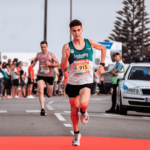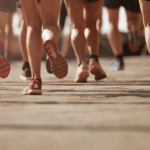Nutrition is very crucial as one prepares for a half marathon race. Their are a number of runners have an untimely career where they fail to realize the advantage of pre race nutrition. Their diets the night before an event can however determine the success of their race. This night is critical because it is the last time a runner gets a chance to consume all the nutrients they need, and the energy needed to perform optimally during a race. Food choices have a very great impact on energy levels and endurance and the knowledge around them can help a lot.
One equally important aspect to have in mind is that your body has enough glycogen, the carbohydrate vitality reserve, and source of power for endurance events, to begin with, and why not, always. Few, if any, of the unsupervised runners are knowledgeable regarding carbohydrate selection. Equally important is to consider the fuel of your muscles’ power – hydrating food. Another side is also the use of lean meats which aid on muscle injury recovery, while minimizing risks of further injuries.
In this article, we will explore optimal food choices for the night before a half marathon. By carefully selecting your pre-race meal, you can enhance your chances of performing well and reaching your goals. When figuring out “what to eat night before half marathon,” it is important to keep in mind the key principles of balancing energy, muscle recovery, and hydration to ensure a successful race day.
The Role Of Carbohydrates In Endurance Events
Carbohydrates are the body’s primary source of energy, especially during endurance events like a half marathon. For runners, ensuring that the body has enough glycogen stores—the stored form of carbohydrates—is essential for optimal performance. The night before the race is the perfect time to load up on carbohydrates, allowing the body to replenish its glycogen reserves, which will be used for sustained energy during the long race. Without sufficient glycogen, runners may experience fatigue much sooner, which can hinder their performance.
Carbohydrate-rich foods are easily digested and provide a slow and steady release of energy. Consuming them the night before helps ensure that your muscles have the energy they need when the race begins. Complex carbohydrates, in particular, are beneficial because they digest more slowly and help maintain stable blood sugar levels throughout the event. These foods also play a role in hydration, as carbohydrates help retain water in the body, which is essential for maintaining performance during the race.
Here are some recommended carbohydrate-rich foods for your pre-race meal:
- Pasta: A classic choice, pasta is a great source of complex carbohydrates that provide a steady energy release.
- Rice: Like pasta, rice is an excellent source of slow-digesting carbohydrates.
- Bread: Opt for whole grain bread for additional fiber and nutrients.
- Quinoa: A highly nutritious grain that provides both carbs and protein.
- Sweet potatoes: Packed with complex carbs and fiber, sweet potatoes also contain essential vitamins.
After consuming these carbohydrate-rich foods, it’s important to ensure that your body has a chance to digest and absorb the nutrients before race day. This digestion process is crucial for ensuring that your body has access to the energy stored in glycogen reserves. Additionally, these foods help prevent dehydration by promoting water retention, which can be vital during a long-distance race. A good balance of these carbohydrates the night before ensures that your muscles are adequately fueled and hydrated, setting you up for success on race day.
Importance Of Lean Proteins
A runner’s diet and preparations for a half marathon entails a number of factors, one of the most crucial being lean protein. During such races, carbohydrates work to provide energy for endurance while the muscles themselves are repaired and recovered through the lean proteins that are consumed during the diet leading up to the event. Ensuring that the body has the appropriate amount of supports and aid during the race is vital. Moderation and allowing the muscles to be well supported is also key. As endurance based events, races place stress on the body and are a controlled form of exercise.
Alongside aiding with endurance events, lean proteins are relatively simple to digest and serve as a source for the amino acids that the body requires for muscle work. Because these proteins can be used to strengthen and rebuild the tissue that becomes damaged during races, the consumption of lean protein is necessary. If runners do not consume enough protein, they open themselves up to muscle soreness, cramping, or injury, all of which are extremely detrimental to performance during the race. Lean sources enable for improved recovery and muscle health while aiding with pre-race meals.
Best Lean Protein Sources For Runners
Grilled meats are an amazing source of lean proteins and so is turkey, fish, tofu, and legumes. They contain the required amino acids and are gentle on the stomach which adds another reason to why they are great pre-race meals. Turkey and chicken are wonderful sources of lean fat and high quality protein, which minimizes the chances of any digestive issues. Omega-3 rich fish such as tuna and salmon have anti-inflammatory features as well so they are an added bonus. Tofu, lentils, and chickpeas are some of the best legumes out there because they are packed with protein, fiber, and other nutrients.
Having these types of protein in your diet alongside carbs will provide you with a more balanced meal. The protein acts as an equilibrium that neutralizes the carbohydrate while restricting muscles usage and avoiding crashes that occur with heavy carbs. It is important to note that adding these two macros is neccessary for improving endurance and overall performance during the race.
By emphasizing on the consumption of lean proteins which aid in muscle tissue recovery and rehabilitation, runners will also be able to sustain the physiological burdens posed in a half marathon. When tackling the question, “what to eat night before half marathon,” addressing protein sources is important and will allow for proper muscle preparation for the race. Choose between grilled chicken, fish, and tofu; all proteins offer essential components which will result in strong muscles during the race.
Foods To Avoid Before A Half Marathon
This can be just as true for some foods as there are those that can jeopardize your successful half marathon. Some of these foods can lead to discomfort, energy changes, and even digestive complications. Specific foods need to be avoided the night before the race to ensure that you have enough energy for the race and your stomach remains settled. Foods that are spicy, high in fiber, and high in fat can lead to bloating, gas and even other gasterointestinal complications which would not allow you to perform at your best.
Eating large portions of these foods the night prior to the event can lead to discomfort during the sleep hours, making it tougher to rest fully before the event. The same goes for bloating calories dense and greasy foods that are going to be tough to digest. This can leave you feeling rested the day of the event. The same can be said for spicy meals. They can lead to an irritated stomach which can ultimately mean heartburn. Additionally, foods loaded with fiber lead to bloating and even an uneasy stomach. Alcohol can lead to more severe complications as it leads to dehydration and further alters to sleep patterns, making it even more complicated to recover.
| Food Type | Reason to Avoid |
| High-fat foods | Can cause bloating, indigestion, and sluggishness |
| Spicy dishes | May irritate the stomach, causing discomfort |
| High-fiber foods | Can cause bloating and digestive discomfort |
| Alcohol | Dehydrates the body and disrupts sleep |
After avoiding these types of foods, your body will have a better chance to process the nutrients you’ve consumed without the added stress of digestion issues. This means you will wake up feeling lighter and ready for race day. The night before a half marathon is not the time to experiment with new or heavy foods—sticking to tried and tested meals will give you the best chance for success. By making informed choices and avoiding these problem foods, you can ensure that your stomach is settled and your energy levels are optimized for the race.
Sample Pre-Race Dinner Menu
A well-balanced pre-race dinner is crucial for ensuring that you are properly fueled and hydrated before the big day. The right combination of carbohydrates, lean proteins, and healthy fats can provide the energy your body needs for a successful half marathon while also supporting muscle function and recovery. When choosing your pre-race meal, it’s important to focus on easily digestible foods that will provide lasting energy without causing digestive discomfort. Below, we’ll break down a sample menu that balances all the essential nutrients.
A Balanced Plate For Race Day Preparation
Ostart with a serving of pasta as your primary carbohydrate source. Pasta is an excellent choice because complex carbohydrates found in pasta convert to energy slowly and provide energy throughout the race. Additionally, it is light in the stomach with no risk of heaviness. Serve the pasta with simple marinara sauce that is light on spices and fat to aid with digestion.
A good choice for protein is grilled chicken breast. Chicken is a lightweight protein that promotes muscle tissue growth and staves off muscle loss during races. This protein will also aid in muscle recovery after the event. If you’re vegetarian, tofu or legumes such as lentils or chickpeas serve as great substitutes. Ease of digestion is improved and as such, these plant based proteins are recommended.
A side of steamed vegetables adds fiber and vitamins to your meal without overloading one’s digestive system. Carrots, spinach and zucchini are vegetables that contain important nutrients and strengthen the immune system, helping one stay healthy leading up to race day. Additionally, a simple side salad with light vinaigret can add fiber and vitamins that aid in digestion and hydration.
For pacing, maintaining a balanced pre-race meal is crucial, so ensure that any carbohydrates eaten such as pasta are stuffed alongside the protein sources like chicken. This lets you take proper nutrition for the race while supporting muscle retention too. Moderation on the other hand is key; to not overfill your stomach. Its ideal to have this meal around 3-4 hours after the day’s final meal.
In summary, understanding what to eat night before half marathon and choosing a well-rounded dinner can help maximize your performance. The combination of complex carbohydrates, lean proteins, and light vegetables ensures that your body is prepared to tackle the physical demands of the race. By sticking to this simple, balanced meal plan, you can feel confident that you are fueling your body in the best possible way for a successful half marathon experience.
Hydration Strategies
Staying hydrated is as important as nutrition when training for a half marathon. The night prior to the event, it is crucial for one’s body to be properly hydrated as it can enhance performance during the run. If one experiences dehydration, it can lead to muscle cramps and fatigue which will put a person out of stamina. These issues will make running the race a lot more difficult than planned. Proper hydration starts the day before the race rather than the morning of it.
Secure the H20 hours before a race is not enough therefore, one should stay constantly hydrated. This is essential not just to the hours before the race but rather the day before too. Electrolyte drinks are very helpful especially to a person who sweats a lot. Alongside water, these drinks replenish sodium, potassium and other crucial minerals to the body. By doing this, a person’s fluid balance will be back at equilibrium and they can avoid wanting fatigue. This will ensure muscle performance during the race is at it’s optimal peak.
- Drink water consistently throughout the day: Start hydrating early and continue drinking water throughout the day. Aim for at least 8-10 cups.
- Incorporate electrolyte drinks if needed: If you’re prone to sweating heavily, consider adding an electrolyte drink to your hydration plan.
- Avoid excessive caffeine and alcohol: Both caffeine and alcohol can lead to dehydration, so it’s best to limit your consumption of these beverages the night before the race.
- Monitor your urine color: A pale yellow color indicates proper hydration, while dark yellow signals dehydration.
Proper hydration can help you maintain energy levels, regulate body temperature, and prevent cramps, all of which are essential for a successful half marathon performance. The night before the race is crucial for preparing your body to handle the stress of the event, and staying well-hydrated is a simple but effective way to optimize your performance.
Essential Strategies For Pre-Race Nutrition And Hydration
It is crucial to take a balanced pre-race meal in addition with proper hydration in order to perform your best when running and triathlon competitions. Equally important to race day meals is the fact that nutrition can be used by the body to sustain energy and prevent fatigue. Focusing on lean proteins and complex carbohydrates will set you on the right track when preparing for a race. Also, maintaining proper hydration will help your muscles function properly and aids in preventing dehydration.
Timing is also an important variable to focus on. It is recommended to consume your pre-race meal about three to four hours before you sleep, while hydration should be done as early as possible. Maintaining proper hydration all throughout the day is important in order to ensure your body is ready for the physical activity during the triathlon or running race. Eating at the right time allows you to digest the food and absorb all necessary nutrients in preparation for race day.
Understanding “what to eat night before half marathon” can help you maximize your chances of success on race day. Focusing on nutrient-rich foods and staying hydrated will provide the foundation for an optimal running experience. Be mindful of your food choices and hydration strategies to give yourself the best opportunity to achieve your goals and finish strong.






